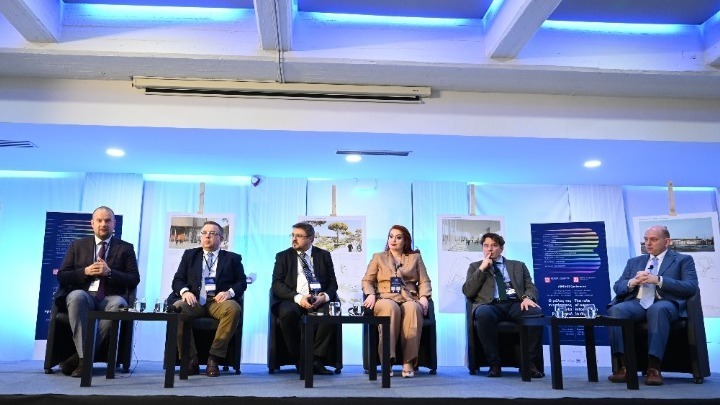Roughly 77 percent of the Greek public learn the news from social media, while there is a trend for most people to put emphasis on information originating from TikTok and Facebook, said Alternate Professor of International Journalism at Aristotle University of Thessaloniki Nikos Panagiotou on Monday, while addressing the Association of Balkan News Agencies – Southeastern Europe (ABNA-SE) Conference on “The role of news information in the new Balkan reality”, organised by the Athens-Macedonian News Agency at Helexpo in Thessaloniki.
Panagiotou underlined the need for verified information, noting that the traditional media have a strong advantage in this area, while adding that there should be a balance between the role of the news agencies in the creation of information and the role of the social media in the dissemination of the information, underlining that it is very important for the public to spend time at the source of news and not only on the bridge for its distribution.
On his part, the General Secretary of the Alliance of European News Agencies (EANA) Alexandru Giboi noted that mass media organisations play an important role as they provide the public with the news. He commented that the traditional media are still a pillar of society and revealed that their role has been enhanced, while it remains of vital importance. At the same time, he said that access to true journalism is imperative as “the pressure on the media is very great and this should lead us to develop further”.
The director general of BTA (Bulgaria) Kiril Valchev focused on the cooperation between the news agencies, noting that the association of news agencies has existed for the last 30 years but its role is now upgraded. In this context he underlined the importance of communication between the news agencies and the exchange of good practices and experiences.
The General Director of the Albanian Telegraphic Agency (ATSH), Armela Krasniqi, presented cases involving fake news, specifically referring to the start of the war in Ukraine and the earthquake that hit Albania in November 2019. “We are aware of how difficult it is to have more democratic societies and not polarisation any more, because we have suffered from the polarisation of the societies,” she said, adding that “on the one hand, we have freedom of speech, which is important for society and, on the other hand, we have the right to information and we should seek a balance between them”.
The conference was attended, among others, by the vice president of the European Commission Margaritis Schinas, the German Consul Sibylla Bendig, the General Consul of Cyprus in Thessaloniki, Constantinos Polykarpou, the consul of France, Sandrine Mouchet, a representative of the Bulgarian Consulate and other diplomatic authorities, the rector of Aristotle University of Thessaloniki Nikos Papaioannou and others.
SOURCE; ANA-MPA









